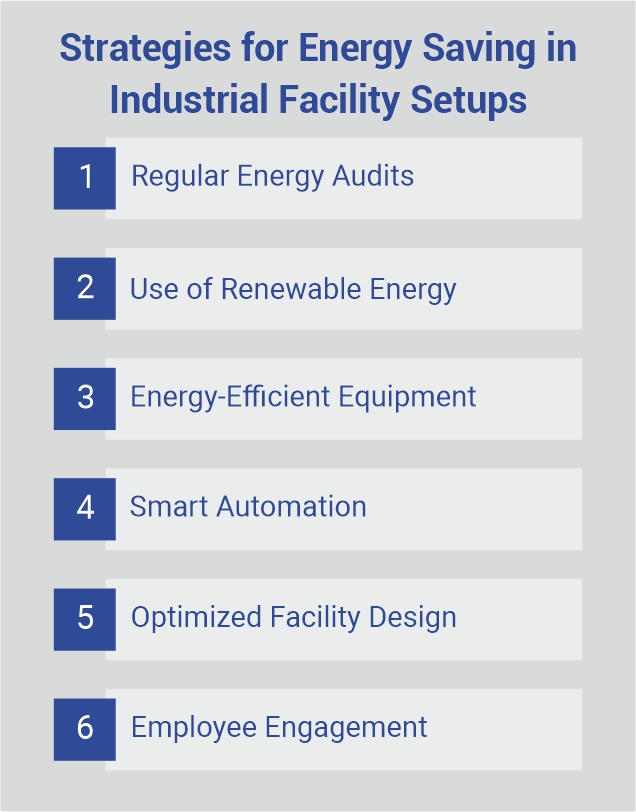Introduction:
As the global economy pivots towards sustainability, Environmental, Social, and Governance (ESG) principles are becoming a cornerstone for industries worldwide. In India, the drive towards ESG compliance is reshaping industrial facility setups, emphasizing energy efficiency as a key metric. Facility management service providers (FMSPs) play a crucial role in this transition, enabling industries to adopt sustainable practices while maintaining operational efficiency.
This blog delves into the significance of ESG in industrial settings, explores energy-saving strategies, and highlights how FMSPs are instrumental in driving ESG adherence in India.
Understanding ESG in the Industrial Context
Environmental, Social, and Governance (ESG) criteria are a framework for evaluating an organization's commitment to sustainable practices. Each pillar has specific implications in industrial facilities management setups:
1. Environmental:
Focuses on reducing carbon footprints, optimizing resource consumption, waste management, and adhering to environmental regulations.
2. Social:
Involves ensuring employee well-being, promoting diversity, and uplifting local communities.
3. Governance:
Encompasses ethical business practices, transparency, and compliance with legal and regulatory standards.
For industrial facilities, ESG compliance is no longer optional—it is a prerequisite for investor confidence, regulatory approval, and societal trust. Energy conservation plays a pivotal role under the environmental aspect, offering a tangible metric for sustainable development.
The Importance of Energy Saving in Industrial Facilities
Industrial operations are energy-intensive, accounting for a significant portion of global energy consumption. In India, where industries contribute extensively to GDP, energy-saving measures directly impact the nation’s sustainability goals.
1. Cost Reduction:
Energy efficient operations lower utility costs, enhancing profitability.
2. Environmental Impact:
Reduced energy consumption leads to lower greenhouse gas (GHG) emissions, aligning with India's commitment to the Paris Agreement.
3. Regulatory Compliance:
Adherence to energy conservation norms, such as those under the Energy Conservation Act, is crucial for industrial setups.
4. Enhanced Reputation:
Sustainable practices bolster brand image and attract eco-conscious investors.
Strategies for Energy Saving in Industrial Facility Setups

Implementing energy-saving measures requires a holistic approach encompassing technology, operational changes, and employee engagement. Here are some key strategies:
1. Energy Audits:
Conducting regular energy audits helps identify inefficiencies and areas for improvement. These audits provide actionable insights for reducing energy waste.
2. Use of Renewable Energy:
Installing solar panels, wind turbines, or biomass systems can significantly offset dependence on conventional energy sources.
3. Energy-Efficient Equipment:
Upgrading to energy-efficient machinery, such as LED lighting and HVAC systems, reduces power consumption. For instance, variable frequency drives (VFDs) in motors can optimize energy use.
4. Smart Automation:
The integration of IoT (Internet of Things) enables real-time energy monitoring and optimization, reducing wastage during idle periods.
5. Optimized Facility Design:
Using green building principles—such as proper insulation, natural lighting, and ventilation—lowers energy dependency.
6. Employee Engagement:
Training and awareness programs encourage employees to adopt energy-saving practices, fostering a culture of sustainability.
The Role of Facility Management Service Providers
Facility management service providers are pivotal in helping industrial setups achieve their ESG and energy-saving goals. In India, where industrial diversity ranges from heavy manufacturing to tech hubs, FMSPs offer tailored solutions to meet specific needs.
How FMSPs Drive ESG Compliance
1. Sustainable Operations:
FMSPs incorporate eco-friendly practices, such as waste segregation, recycling, and water conservation, into their service offerings.
2. Energy Management Expertise:
Facility managers implement energy-saving technologies, conduct audits, and suggest upgrades to improve energy efficiency.
3. Regulatory Adherence:
FMSPs ensure compliance with environmental laws and standards, such as ISO 14001 for environmental management systems.
4. Employee Well-being Initiative:
Through amenities like ergonomic workspaces and clean environments, FMSPs contribute to the social aspect of ESG.
5. Transparency and Reporting:
Many FMSPs provide clients with regular reports on sustainability metrics, ensuring accountability and informed decision-making.
Case Study: Energy Saving in Indian Industrial Facilities
Context: An automobile manufacturing plant in Pune sought to reduce its energy consumption while adhering to ESG norms.
Action Plan by FMSP
1. Energy Audit:
Conducted a comprehensive audit to identify inefficiencies in lighting and machinery operations.
2. Smart Systems:
Installed motion-sensor lighting and IoT-based energy monitoring systems.
3. HVAC Optimization:
Retrofitted HVAC systems with energy-efficient components.
4. Renewables:
Deployed solar panels to supply 25% of the facility's energy needs.
Outcome
- Energy consumption reduced by 18%.
- Annual savings of ₹12 lakh in electricity costs.
- A 20% reduction in carbon emissions, boosting ESG compliance scores.
Challenges in Energy Saving for Industrial Setups
Despite the evident benefits, energy-saving measures face several challenges:
1. High Initial Costs:
Investments in renewable energy and energy-efficient equipment can be prohibitive for small-scale industries.
2. Lack of Awareness:
Many industries remain unaware of available energy-saving technologies and government incentives.
3. Resistance to Change:
Employees and management may resist transitioning to energy-efficient systems due to operational disruptions.
4. Complex Regulations:
Navigating the regulatory framework for ESG compliance requires expertise and time.
The Indian Perspective: Government Policies and Incentives
India has established various policies and incentives to promote energy efficiency and ESG compliance in industrial facilities:
1. Perform, Achieve, and Trade (PAT) Scheme:
Introduced by the Bureau of Energy Efficiency (BEE), PAT incentivizes industries to improve energy efficiency through tradable energy-saving certificates.
2. National Action Plan on Climate Change (NAPCC):
This includes the National Solar Mission, encouraging the adoption of solar energy.
3. Tax Benefits:
Industries investing in energy-saving equipment can avail of tax deductions under Section 35AD of the Income Tax Act.
4. Energy Conservation Building Code (ECBC):
Mandates energy-efficient building designs for industrial setups.
FMSPs play a crucial role in helping industries leverage these policies by providing technical guidance and implementation support.
The Future of ESG and Energy Saving in India
As India transitions to a low-carbon economy, ESG compliance and energy conservation will gain further prominence. Advances in technology, such as AI-driven energy optimization and blockchain-based energy trading, are set to revolutionize industrial operations.
Facility management service providers will continue to be at the forefront of this evolution, enabling industries to adapt to emerging trends and meet their sustainability goals.
Why FFServices Pvt Ltd is Your Ideal Partner
At FFServices Pvt Ltd, we are committed to driving ESG compliance and energy efficiency for industrial facilities across India. Our comprehensive facility management solutions include:
1. Energy Audits and Optimization:
Identifying inefficiencies and implementing solutions tailored to your needs.
2. Renewable Energy Integration:
Helping industries transition to solar, wind, or hybrid energy systems.
3. Sustainability Reporting:
Providing transparent metrics to track ESG performance.
4. Employee Training:
Conducting workshops to foster a culture of sustainability.
With operations spanning over 350+ locations and a legacy of serving diverse industrial sectors, FFServices Pvt Ltd is equipped to lead your facility towards a sustainable future.
Conclusion
ESG and energy saving are no longer optional aspirations—they are essential imperatives for industrial facilities in India. The collaboration between industries and facility management service providers is critical in achieving these goals. By adopting innovative energy-saving strategies and adhering to ESG principles, Indian industries can enhance their global competitiveness while contributing to a sustainable future.
Facility management service providers like FFServices Pvt Ltd are not just service providers—they are partners in your sustainability journey. Together, we can build a greener, more resilient industrial landscape. Contact us for your tailor-made IFM requirements.
Industries we serve:
Automobile | Manufacturing | Pharmaceutical | Oil and Gas | Healthcare | Ancillary | FMCG | Education | Real Estate | Commercial | Mining | Hotels
Also read: The Role of IFM in Schools and Universities

